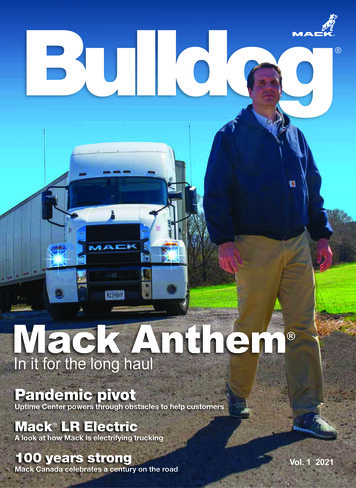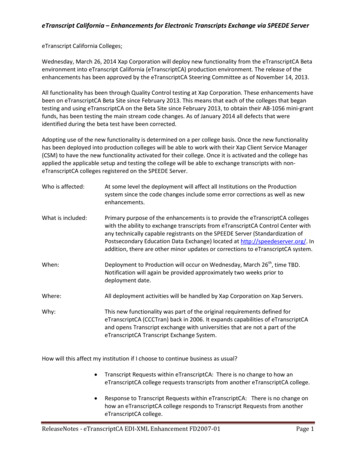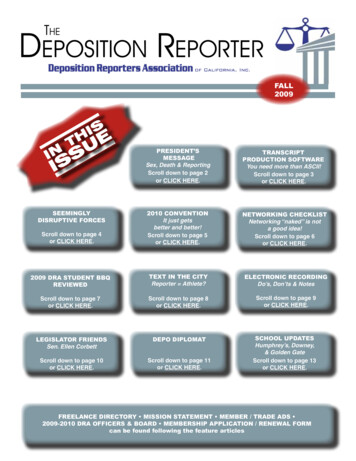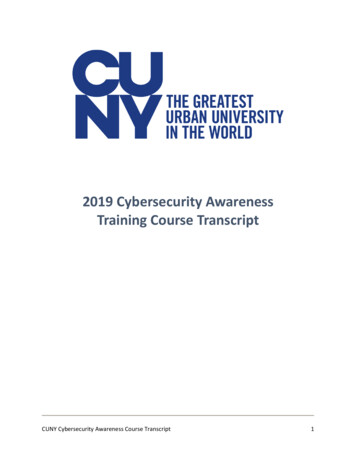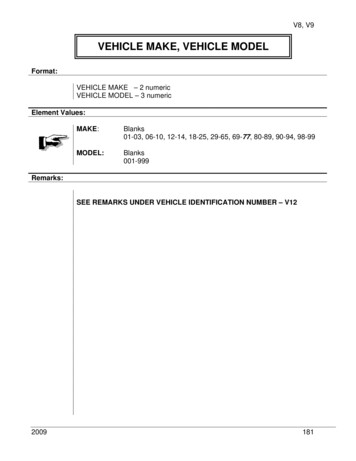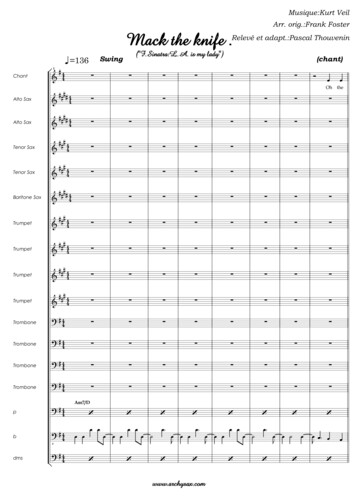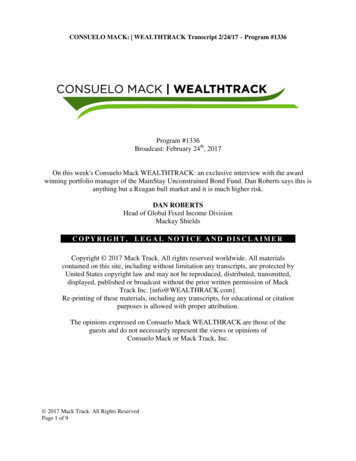
Transcription
CONSUELO MACK: WEALTHTRACK Transcript 2/24/17 – Program #1336Program #1336Broadcast: February 24th, 2017On this week's Consuelo Mack WEALTHTRACK: an exclusive interview with the awardwinning portfolio manager of the MainStay Unconstrained Bond Fund. Dan Roberts says this isanything but a Reagan bull market and it is much higher risk.DAN ROBERTSHead of Global Fixed Income DivisionMackay ShieldsCOPYRIGHT, LEGAL NOTICE AND DISCLAIMERCopyright 2017 Mack Track. All rights reserved worldwide. All materialscontained on this site, including without limitation any transcripts, are protected byUnited States copyright law and may not be reproduced, distributed, transmitted,displayed, published or broadcast without the prior written permission of MackTrack Inc. [info@WEALTHRACK.com].Re-printing of these materials, including any transcripts, for educational or citationpurposes is allowed with proper attribution.The opinions expressed on Consuelo Mack WEALTHRACK are those of theguests and do not necessarily represent the views or opinions ofConsuelo Mack or Mack Track, Inc. 2017 Mack Track. All Rights ReservedPage 1 of 9
CONSUELO MACK: WEALTHTRACK Transcript 2/24/17 – Program #1336CONSUELO MACK: On this week’s WEALTHTRACK exclusive, award winning bond fundmanager and former Washington economist Dan Roberts explains why this is no Reagan bullmarket and why he is going risk off in his portfolios, next on Consuelo Mack WealthTrack.CONSUELO MACK: hello and welcome to this edition of WealthTrack, I’m Consuelo Mack.Animal spirits are up business, consumer and investor confidence have been improving formonths. Ever since the election the markets have been building on the strength of last yearwhen just about every asset class, stocks, bonds and commodities rose. There are fundamentalreasons for optimism, some recently cited by Federal Reserve chair Janet Yellen. The economyhas continued to make progress The labor market has improved with large declines inunemployment rates for all major demographic groups. Consumer spending has continued to riseat a healthy pace Business sentiment has noticeably improved in the past few months And inflation is picking up. As measured by the Fed’s favored personal consumptionexpenditures index, or PCE, total consumer prices rose 1.6% in 2016, still below the FOMC’s2% target but up 1 percentage point from its pace in 2015.When you add it all up the Fed expects the “evolution of the economy to warrant further gradualincreases in the federal fund rates to achieve and maintain its dual mandate of maximumemployment and price stability.But many on Wall Street believe there is another element at play, which explains the strongmarket rally since the election. They believe the Trump administration’s agenda of tax reform,fiscal stimulus and regulatory rollbacks is very positive for the economy and business. Theyliken it to the Reagan era when similar policies did result in accelerating economic growth and aprolonged bull market.This week’s guest believes they are overly optimistic, and that bold assumption is dangerous forinvestors. He is Dan Roberts, chief investment officer and head of the global fixed incomedivision at MacKay Shields, a global fixed income manager with approximately 95 billion inassets under management. He is co-portfolio manager of two award winning mutual funds. TheMainStay Income Builder Fund is rated five-star by Morningstar and is ranked in the top decileof its world allocation category over the past 3, 5 and 10 year periods. The MainStayUnconstrained Bond Fund has a four-star rating and is rated in the top 11th and 18th percentilerespectively over the five and ten year periods. It is also a 3-time Lipper Award winner.Mainstay is a WealthTrack sponsor, but Roberts is here because of his long term investmentrecord. Roberts also has a background in Washington, serving in the Reagan White House withthe president’s council of economic advisors, and as chief of staff of the U.S. congress’ jointeconomic committee, which is yet another reason to have him on WealthTrack now. I asked himwhy he feels so strongly that this is not a Reagan bull market. 2017 Mack Track. All Rights ReservedPage 2 of 9
CONSUELO MACK: WEALTHTRACK Transcript 2/24/17 – Program #1336DAN ROBERTS: Consuelo, the reason that we think that this is not as simulative as the marketsuggests, is that we think the market needs to take into account what the states of the economieswere when Reagan took over.CONSUELO MACK: In ’81.DAN ROBERTS: In ’81 and when Trump took over. In 1981 when Reagan took over, you recallthat interest rates, the federal funds rate were almost 20 percent.CONSUELO MACK: Versus under one now.DAN ROBERTS: Versus under one now. The unemployment rate was seven and a half percent,versus almost three percentage points lower today. It’s anywhere between four and a half andfive percent. And inflation was running at about 13 percent when Reagan took over. UnderTrump, when he’s taken over, it’s about two percent. So the environments are really, really verydifferent, and so when you think about the policies that are being imposed, yes, they are verysimilar policies.CONSUELO MACK: I know, but that’s what people are looking at. They’re looking at tax cuts.They’re looking at fiscal stimulus. They’re looking at regulatory rollbacks, and they’re saying,“Reagan,” and those are similar. Right?DAN ROBERTS: Very similar, very similar.CONSUELO MACK: But we’re in a very different place you just described as far as the macroeconomic situation is, like polar opposites.DAN ROBERTS: Exactly. Absolutely. That macro situation makes a huge difference in terms ofthe impacts of those policies. What the market believes is all three of these things are going tohave very significant positive impacts. So let’s take a look at all three. Are they going to havebig, significant, positive impacts? The market’s up a lot, and you think to yourself, the market’sup a lot, yet people generally I think would agree that there’s a lot more uncertainty that we facetoday. So when the market is facing all of this uncertainty – and to be fair it’s both positive andnegative uncertainty, but the market’s facing all of this uncertainty – the market doesn’t likeuncertainty.CONSUELO MACK: What’s more uncertain about today than in 1981?DAN ROBERTS: Well, I think people are just very uncertain about what this currentadministration’s policies are finally going to work out to be. What’s going to go through?What’s going to be passed? What’s finally going to become the law of the land? So for examplethe tax cut, we can get a sense of I think the degree of stimulus that was available under theReagan administration and the degree of stimulus that is available under the Trump 2017 Mack Track. All Rights ReservedPage 3 of 9
CONSUELO MACK: WEALTHTRACK Transcript 2/24/17 – Program #1336administration. So when Reagan took over, the top marginal tax rate you may remember was 70percent, seven zero. Living in New York State in New York City, you add another ten to 15percent on that, and what do you have? Well, for every dollar you make, you’re giving 80 to 90percent of it to the government, state, local or federal.CONSUELO MACK: I would call that confiscatory. (Laughter)DAN ROBERTS: Today it’s 39.6.CONSUELO MACK: For the top income.DAN ROBERTS: For the top income. So what Reagan said is, “I’m going to lower that. I’mgoing to lower it from 70 percent,” and he ultimately lowered it to 28 percent or 42 percentagepoints. Now when you start at 39.6, you can’t lower it (Laughs) the 42 percentage points, butwhat Trump has said is he said, ‘We’ll, we’re going to lower it to 33 percent.” So he’s going tolower it six, seven percentage points. Reagan’s tax cut was six or seven times what this is. Willthis be simulative? Are tax cuts simulative? Of course they are. Yes, they are. Empiricalevidence suggests they are. They are simulative, but it’s the degree that we’re talking about. Sothose are tax cuts.CONSUELO MACK: How simulative would it be if he reduces by six percentage points?DAN ROBERTS: The multiplier that people use, in other words, if you cut taxes by one dollar,what kind of GDP lift do you get? Well, it’s as much as three dollars. It’s one of the moststimulative kinds of policies that the government can run. Now on the other hand when you lookat infrastructure spending or you look at fiscal policy, it’s a different kettle of fish here. Nowremember, today we are close to if not at full employment. Now people will say we have anothercouple percent or another 0.2 percent maybe to go down, but I think everyone would agree thatwe’re at least close to full employment. That means that almost everyone that wants a job can geta job. Now when you think about Trump’s policies of, well, what I’m going to do is I’m going tocome in and I’m going to do a great deal of fiscal spending. I’m going to build roads. I’m goingto build bridges. I’m going to do all of this infrastructure spending.CONSUELO MACK: And I’m going to create “good” jobs. That’s what’s he’s saying, too. I’mgoing to create higher-paying jobs.DAN ROBERTS: Right and maybe his jobs are somewhat higher-paying, but does Trump haveto do? He has to go to the private sector where people are already employed and convince themto come to the public sector. Now one way he can do that, and the way he probably will do it, isto raise wages. That’s inflationary. So number one is we’re going to get inflation out of this.Number two is, how really stimulative is it when you move somebody who already has a job inthe private sector, take them out of the private sector and put them into the public sector? Is thata really huge boost to GDP? We don’t think it is. So you look at tax cuts and, yes, there will be 2017 Mack Track. All Rights ReservedPage 4 of 9
CONSUELO MACK: WEALTHTRACK Transcript 2/24/17 – Program #1336some stimulus from the tax cuts but nothing like we saw under Reagan. Then you look.Remember we’re starting at full employment, and when you start at full employment, it’s veryhard to raise GDP by employing more people because there aren’t a lot more people to employ.CONSUELO MACK: Regulatory rollback.DAN ROBERTS: Regulatory reform, will that and has that over time increased productivity and,therefore, increased GDP? Yes, it has. But there are thousands of these regulations that have tobe rolled back. How long is that going to take? It’s going to take some time in order for that tohappen. So we’re not going to see the stimulative impact of that regulatory reform for some time.CONSUELO MACK: Let me ask you about the fundamental underpinnings of the market rally. Iknow the market has rallied tremendously since the November 8th election, but it also had ralliedfrom the last year’s February low a great deal. So there are people out there who are saying look.This would have happened anyhow, I mean the economy is getting stronger. Aren’t thefundamentals pretty good anyhow?DAN ROBERTS: Yes, yes.CONSUELO MACK: I mean how much of the rally do you attribute to the Trump assumptions?DAN ROBERTS: Well, I mean let’s start with the fundamental underpinnings. Central banksaround the world have been stimulative for some time.CONSUELO MACK: Years.DAN ROBERTS: For years, and that’s made a big difference. So the underpinnings were alreadythere. You’re absolutely right. So when we look at that additional rally, what we’re saying toourselves is if the market really does believe that the policies that Trump is putting in place aregoing to be very similar, which they are, and the impact is going to be very similar to whathappened during the Reagan administration, we’re just saying we don’t think the market has thatpart of it right.CONSUELO MACK: Dan, therefore, how dangerous are these Trump policies? We didn’t evenmention trade protectionism. Some of the things that MacKay Shields, some of your colleagues,have written about are how disruptive Trump policies could be geopolitically, economically. Sotalk to us about that aspect of this, of the negative disruption potential.DAN ROBERTS: Well, the negative disruption potential could be significant, but we don’t knowyet. We don’t know yet. Congress has to approve this. Trump’s own party, the Republican Party,is a free trade party. So they’re not going to line up behind this. So let’s take a look at trade. Thenegative impacts of this could be something like what we experienced. This would be anextreme, but it could happen. Back in 1930 there was the Smoot-Hawley Tariff Act, and 2017 Mack Track. All Rights ReservedPage 5 of 9
CONSUELO MACK: WEALTHTRACK Transcript 2/24/17 – Program #1336President Hoover at that time put 20,000 tariffs on imported goods.CONSUELO MACK: To protect the American market. It would be kind of America first redux.DAN ROBERTS: What happened to world trade? You can imagine if we’re doing it. Do youthink everybody else is just going to sit by and say, “Oh, go ahead and do that”? No. Whathappened is world trade spiraled down. That’s a real worry, and that is we should let countriesand people, they should compete at their comparative advantage and using their comparativeadvantage. Putting on tariffs is not a good way to do it. The problem we have is if you stopcountries using their comparative advantage, then everybody suffers. We’ve seen that before.We’ve seen with Smoot-Hawley what happens. We don’t want to go down that path.CONSUELO MACK: No. Definitely do not want to go down that path. What do you do as aninvestor? You told me that you’ve taken risk off in your portfolios in a meaningful way. Whyare you reacting so strongly to this environment?DAN ROBERTS: Well, as we see this overreaction, what we’ve said to ourselves is that in someparts of the market the valuation just doesn’t.CONSUELO MACK: Make sense.DAN ROBERTS: justify the risk that we’re taking on.CONSUELO MACK: I see. So high-yield being one part of the market.DAN ROBERTS: Well, some parts of the high-yield market.CONSUELO MACK: What other areas of the market?DAN ROBERTS: Well, I mean high-yield is probably the center, but basically is: when you lookat any of the higher risk sort of asset classes what you’ll find is that there’s been a compressionin spread.CONSUELO MACK: So what are the other higher risk areas? In the MainStay Income Builder,I know you and Epic, MacKay Shields does the fixed income portion. But you’re doing kind ofthe asset allocation. Right? Between the two?DAN ROBERTS: We are, and in Income Builder we are doing the same kinds of things. We’retaking risk off in the same kinds of ways as we are in our other portfolios, and that is in thoseparts of the market that we find are the riskier parts of the market where valuations have reallycome up, but it’s not justified, we don’t think it’s. in other words, we’re not really beingcompensated for the risk that we’re taking off. What we’re doing is we are putting the money inother areas like investment grade, like bank loans. So we’re shifting our allocations as we see 2017 Mack Track. All Rights ReservedPage 6 of 9
CONSUELO MACK: WEALTHTRACK Transcript 2/24/17 – Program #1336we’re not being compensated for the risk.CONSUELO MACK: How much attention are you as a money manager paying to what’s goingon in Washington versus what you typically would have done let’s say a year ago?DAN ROBERTS: Well, clearly uncertainty in Washington has, and I think everyone wouldagree, is higher than it has been. Our style is that we don’t really look at the headlines. We don’tlook at the tweets. We are a longer-term investor, so what we try to do is we try to look atstrategy. And what that means is that we try to look at those policies that we think will make abig impact over time and those policies that have a higher probability of being enacted. So yesthere are things that are going on in Washington and, yes, there are things that we should bepaying attention to, but we’re looking at them very much from a strategic point of view. So anexample of that would be in 2006 and 2007 we started taking risk out of the portfolios. Webelieved that what was going on with the Federal Reserve – the Federal Reserve had raised ratesfrom 2004 to 2006 something like 17 times – and what we believed was that the Fed would pop anumber of bubbles that had arisen. Those are the kinds of things that are important to us, and infact they did, and those had very significant long-term impacts. So those are the kinds of thingsthat we try to look at given our style.CONSUELO MACK: So fast forward to today, what are the policies that are having an impacton your strategy today? Are there any?DAN ROBERTS: Yes. So it’s the things that Trump has brought up. For example, the tax cuts,infrastructure spending, regulatory reform but also of course, what is the Federal Reserve doing,and how will the Federal Reserve react given everything else that’s going on. Those are thethings that we think have a big impact. They are likely to be enacted and, given our style, thoseare the things that we’re focused on.CONSUELO MACK: What about the Federal Reserve and how policy is going to be affected?DAN ROBERTS: Well, the Federal Reserve said and we believe that the Federal Reserve willcontinue to monitor the economy and that if they see that the impacts from the Trump policiesare starting to stimulate the economy and in particular start inflation, the Federal Reserve willreact, and we believe that they will react reasonably strongly to that. Now why is that? Why willthey react reasonably strongly?CONSUELO MACK: Contrary to the way they’ve been very dovish!DAN ROBERTS: The reason is the Federal Reserve has created this enormous pool of reserves.It’s been very stimulative for a long time, so it’s been adding monetary base for quite some time.If all of that stimulus starts to be translated into inflation, we’re going to have a problem.CONSUELO MACK: What kind of a problem? 2017 Mack Track. All Rights ReservedPage 7 of 9
CONSUELO MACK: WEALTHTRACK Transcript 2/24/17 – Program #1336DAN ROBERTS: Significant inflation, and the Federal Reserve knows that, and they know thatthey need to react and they’re going to have to react pretty fast (Overlap/Inaudible).CONSUELO MACK: By raising interest rates.DAN ROBERTS: Yes, exactly right. The risk markets aren’t going to like that very much.CONSUELO MACK: Going forward, what are you going to be watching that’s going todetermine your strategy?DAN ROBERTS: The Federal Reserve.CONSUELO MACK: The Federal Reserve.DAN ROBERTS: What’s going to be a big determiner of what the Federal Reserve does is goingto be inflation. We’ll have to watch to see how Trump’s policies turn into inflation. The FederalReserve is one of the first triggers that we generally see. The Federal Reserve is trying to slowthe economy, and as they try to slow the economy, eventually they will get it slowed, and sothat’s one of the very first things that we look at.CONSUELO MACK: Another question. Many bond investors have been told for several yearsnow that the bond markets are very high risk; that they’re overpriced. Interest rates are going tostart to go up which they’ve started to do. You run an unconstrained bond fund. You can goanywhere, invest in anything. How high-risk do you think the bond market is, and therefore howdefensive are you getting in your portfolio?DAN ROBERTS: With the unconstrained bond fund, we have a relatively short duration,because we do believe that there is risk of rates rising. If the economy starts to pick up andinflation starts to pick up, the Fed will start to raise rates, and as they start to raise rates it willaffect all of the rates. The curve will probably continue to flatten, but it will impact all rates, andas a bond manager that’s something that people need to be concerned about, and that is theycould lose money as rates continue to rise.CONSUELO MACK: Short duration means basically that the securities that you have are goingto be the least interest rate sensitive so, therefore, they’re usually shorter maturities. Right?DAN ROBERTS: They are. That’s right.CONSUELO MACK: Another question is about the MainStay Income Builder Fund. Investorshave been searching for income for a long time, harder and harder to get. Where are you findingincome in the Income Builder Fund? 2017 Mack Track. All Rights ReservedPage 8 of 9
CONSUELO MACK: WEALTHTRACK Transcript 2/24/17 – Program #1336DAN ROBERTS: So the Income Builder Fund we’ve been investing in the same kinds of thingsthat we’ve been investing in the unconstrained portfolios. That is, we have been investing incredit instruments and mostly in credit instruments.CONSUELO MACK: That means credit instruments are.DAN ROBERTS: Investment grade bonds, in high-yield bonds, and those bonds pay a spreadover U.S. Treasuries. So they allow us to make more than what we otherwise would make hadwe put this in very, very short duration LIBOR instruments or Treasury instruments.CONSUELO MACK: Final question, Dan. One investment for a long-term diversified portfolio.What would you have all of us buy or own in a long-term diversified portfolio?DAN ROBERTS: So what I would suggest to your viewers is that they consider a balanced fundat this point, and a balanced fund is a fund that invests in both stocks and bonds, and then whatwe believe is that they should hire someone, an active manager that will make that switchbetween stocks and bonds depending on what they think the economic environment looks like.So I think they want to look for an active manager, and they want to look for an active managerthat will take them out of risk if they believe that the market environment is starting to change.At this stage of the cycle, we think that that is a particularly important point.CONSUELO MACK: Dan Roberts, thank you so much for joining us on WealthTrack.DAN ROBERTS:Thank you very much, Consuelo. I very much enjoyed it.CONSUELO MACK At the close of every WEALTHTRACK we try to give you one suggestionto help you build and protect your wealth over the long term. This week’s action point is: de-riskyour bond portfolio. High yield bonds and emerging market debt have been excellent performersinvestments, up 17% and 10% respectively last year. With the economy improving, the FederalReserve prepared to raise rates again and political uncertainty building it is a propitious time totake some gains and trim those positions.To hear more of Dan Roberts interview click on the Extra feature on our websiteWealthtrack.com. Also thank you for contacting us on Facebook and Twitter. It might take ussome time but we will respond to each and every one of you. Have a great weekend and makethe week ahead a profitable and a productive one. 2017 Mack Track. All Rights ReservedPage 9 of 9
MainStay Income Builder Fund is rated five-star by Morningstar and is ranked in the top decile of its world allocation category over the past 3, 5 and 10 year periods. The MainStay Unconstrained Bond Fund has a four-star rating and is rated in the top 11th and 18th percentile respectively over the five and ten year periods.



